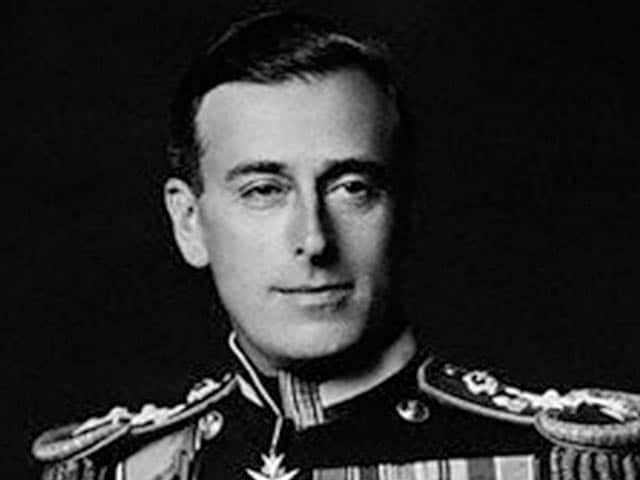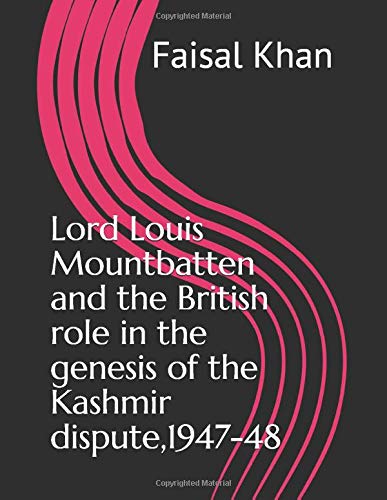
 In some ways, this is a self-centred piece as it is on the topic of my recently-published book. However, the very reason I wrote the book was that the subject area has a powerful resonance with me – given my Pakistani heritage – and for many who come from the Asian subcontinent.
In some ways, this is a self-centred piece as it is on the topic of my recently-published book. However, the very reason I wrote the book was that the subject area has a powerful resonance with me – given my Pakistani heritage – and for many who come from the Asian subcontinent.The book is basically an upgraded version of my master’s thesis, which I submitted 17 years ago while completing my studies at the LSE.
For long, I had no intention of publishing it but having recently re/discovered writing and knowing that it contained archival and perhaps revelatory research, I felt the story was one that needed to be told.
Kashmir is rarely out of the global headlines. In February of this year, for example, after a Muslim Kashmiri carried out a suicide bombing that killed 44 Indian army personnel, Indian jets crossed the line of control and carried out attacks in Pakistani territory.
Pakistan retaliated by shooting down an Indian fighter jet. Had it not been for shrewd statesmanship by Imran Khan – in returning the captured pilot – a war between two nuclear-armed powers was a distinct possibility.
Then in August, India suspended article 370 of its constitution (which gives Kashmir special status) and in the lead up to the move increased its troop presence in the region. Since then, 8 million Kashmiris have been in ‘lockdown’, facing curfew conditions with minimal or no access to the outside world.
According to some estimates, there are now some 700,00 Indian troops in Kashmir – that is approximately half of all its armed forces (Kashmir is one of 29 Indian states). This is what occupation looks like.
The region remains the principle source of tension between Pakistan and India and India and most Kashmiris. The conflict has led to two wars – and what Indian prime minister Atal Bihari Vajpayee dubbed a ‘war-like situation’ – between the two neighbouring countries.
It has resulted in the deaths, according to the UN, of at least 50,000 Kashmiris (mainly in Indian controlled) Kashmir since 1989.
Did this need to be the case? What was the British role in initiating this prolonged conflict? What was Lord Mountbatten’s role in all this? Could all this pain, war and bloodshed have been avoided?
The Last Viceroy And Kashmir
Lord Mountbatten arrived in India in March 1947 as the Last Viceroy with a clear remit to transfer power from the British to the successor dominion/s. He was not there for long, but was to leave an indelible imprint on the ‘Indian subcontinent’.
At this point, India was made up of 565 separate states; some big, some small, some wealthy, some poor, some models of good administration and some primitive and inefficient. Most would be absorbed into the successor dominions after independence.
As Kashmir was a princely state and not directly controlled by the British, it was in theory allowed to choose its own future after independence.
Given most states were ‘encouraged’ to join either India or Pakistan by the British and that religion was the principal basis for dividing India it was assumed that as Kashmir’s population was (at the least) 80% Muslim, it would join Pakistan. After all, the ‘K’ in Pakistan stood for Kashmir. However, this is not how events would transpire.
The British weren’t keen on dividing India as they felt a united India would be the best way to maintain their strategic interests in the region post-independence. Moreover, Pakistan was a new concept and an unknown quantity which made it very difficult for many including the Maharajah (Hari Singh) of Kashmir to be predisposed towards.
As Viceroy (between March-August 1947) contrary to the accounts of some Pakistani historians, Mountbatten did not display an overwhelming bias towards India – or any side for that matter.
There was, however, some evidence of his inclination and leanings.
In April 1947, for instance, he returned the area of Gilgit – which had been leased to the British – to the Maharajah of Kashmir.
Given the area was overwhelmingly Muslim, and that other options were available (like cancelling the lease or gifting Gilgit to the NWFP) this gesture implied he envisaged Kashmir being absorbed by India.
Then there is his relationship with Nehru; the influence of which can perhaps only be underestimated and one which was to have a pivotal impact on the history of the whole subcontinent. Both Lord Mountbatten and his wife Edwina found Nehru for more personable and charming than Jinnah (they felt the latter was ‘cold’). In fact, Lady Edwina (whose promiscuity is now well established) had a deeply intimate relationship with Nehru.
Perhaps the clearest example of the impact of this relationship came in May 1947 on the issue of the partition of India. While on a weekend trip to Shimla, Mountbatten was unsure about the partition plan forwarded to London (otherwise known as Plan Balkan). He broke with protocol and against the advice of his colleagues, decided to show the plan to Nehru.
Nehru vehemently rejected it, after which Mountbatten asked V. P. Menon to re-draft a plan more acceptable to him. This was a stunning and monumental display of impropriety by Mountbatten; and one with lasting consequences.
Alas, in a similar fashion when Mountbatten visited Kashmir as Viceroy, he asked Nehru for a memorandum on Kashmir (neither Jinnah nor anybody on the Pakistani side for that matter were afforded the same privilege). When in Kashmir, he implied to the Maharajah that Kashmir would be better of joining India rather than Pakistan after the British left.
From Viceroy to Governor-General
Having been slighted by Jinnah for the role of joint Governor-General Mountbatten went truly ‘native’ as Governor-General of India. When in October 1947, Maharajah Hari Singh sought help from the Indians after an apparent Invasion by Pashtun tribesman from NWFP, Mountbatten insisted to the Maharajah that India would only assist once Kashmir accedes to India (such a step would be temporary, conditional upon an eventual plebiscite).
Despite being immediately challenged by some of his Indian colleagues, Mountbatten remained adamant. Maharajah Hari Singh duly agreed.
This decision was to prove pivotal and perhaps more than any other was to shape the ensuing conflict. The necessity of Mountbatten’s actions have been called into question by many; both his contemporaries and historians.
There were even at this stage other options available to him. He could’ve escalated the issue to the newly formed UN or involved the Pakistanis in dialogue. He could, also, have agreed to help Maharajah Hari Singh without demanding accession.
Mountbatten was widely castigated for his actions by many including the Pakistanis, representatives of the UN and the British. Winston Churchill, for example, accused him of having planned and organised the first ‘victory of Hindustan’ against Pakistan by sending in British trained soldiers and British equipment to ‘crush and oppress the Muslims in Kashmir’.
To be fair, once the conflict began to take shape, he and the Attlee government made genuine efforts to resolve the issue; to the point of risking his relationship with Nehru and standing with his Indian colleagues. By then, it was too late the Indians had what they wanted and Nehru, it seems, had no intention of calling a plebiscite.
The British and Lord Mountbatten’s responsibility for initiating the Kashmir conflict is both clear and considerable. Yet in many respects, my adopted home (Britain) has never taken full responsibility.
Why, for example, has our government been relatively quiet in recent weeks despite Indian’s aggressive actions? Why – except in its formative stage – has Britain (despite enjoying good relations with both India and Pakistan and the US) not pushed proactively and consistently to resolve the dispute? What of the referendum that the people of Kashmir were promised?
Mountbatten would meet a horrific end at the hands of the IRA in August 1979 (the same month ironically that India was partitioned). In a speech a few weeks later, the Sinn Fein’s Gerry Adam argued ‘what the IRA did to him is what Mountbatten had been doing all his life to other people’.
A recently published book by historian Andrew Lownie reveals that Lord Mountbatten was a ‘homosexual with a perversion for young boys’.[1] His reputation is now in tatters; I suspect few in Kashmir or Pakistan will have any sympathy.
[1] Andrew Lownie; ‘The Mountbattens: Their Lives & Loves.’ Blink Publishing, London 2019.
